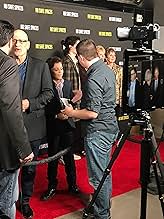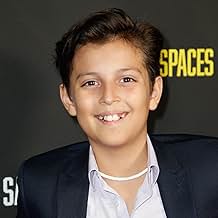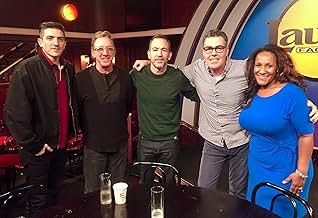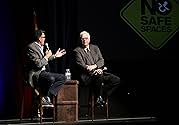NOTE IMDb
7,1/10
2,9 k
MA NOTE
Ce film révèle en quoi les politiques identitaires et la suppression de la liberté d'expression se propagent dans toutes les couches de la société et menacent de diviser l'Amérique.Ce film révèle en quoi les politiques identitaires et la suppression de la liberté d'expression se propagent dans toutes les couches de la société et menacent de diviser l'Amérique.Ce film révèle en quoi les politiques identitaires et la suppression de la liberté d'expression se propagent dans toutes les couches de la société et menacent de diviser l'Amérique.
- Réalisation
- Scénario
- Casting principal
Jordan B. Peterson
- Self
- (as Jordan Peterson)
Alan Dershowitz
- Self
- (as Alan M. Dershowitz)
Avis à la une
This is not just entertainment. It is a documentary. In light of America's longstanding tradition of pushing children through the higher education system in order to realize fulfillment in life, this is essential information. The film documents how the culture of academia has been coopted by identity politics and political correctness, which is now spilling over into the larger culture as well.
All Americans need to see this, no matter what your political stance is. Freedom of speech, even speech we hate, is sacred. America must be a "safe space" where everyone has the freedom to openly debate and argue all viewpoints.
10Gavin247
I read a lot of the "pro-conservative" aspects surrounding this movie, but that just scratches the surface. No Safe Spaces takes a deep dive into the potential harm America faces in regards to silencing our god given rights to free speech. It takes us throughout history and how important it is for our society to maintain our first amendment for EVERYONE, despite what side of the political aisle you sit.
The film shows conservative speakers being threatened, abused and shouted down in order to silence them and universities indoctrinating our youth into not thinking for themselves. At the same time, it makes you think how lucky we are to be able to say what we want and what we feel without the fear of persecution and how we, as a society, need to protect this right.
The film is done very well, and brings the audience an eye-opening experience about our rights as human beings that should never be infringed on. The theatre was packed and when the lights turned on most people had tears in their eyes, as did I and my date. The movie teaches us that it is important to listen, learn and understand each persons point of view and that we should never back down from speaking our minds. Only through dialogue, communication and respect for others will we ever be able to understand each individuals unique perspective, and No Safe Spaces emphasizes this perfectly.
Do yourself a favor and go see this, it's powerful!
I watched Adam Carolla and Dennis Prager's new documentary No Safe Spaces (2019) in a nearly-sold out theater in Alexandria, VA. While it was a decent summery of the latest threats to freedom of speech and expression, and the audience loved it, there were some glaring omissions that left the film feeling incomplete.
If you've been paying attention over the past several years, you've noticed the rise in political activism on both the right and left has led to some alarming developments, including riots, street clashes, and an effort to "de-platform" opposing views on the Internet. No public space has been at the forefront of this conflict more than college campuses.
No Safe Spaces highlights two of the most dramatic episodes of campus activism and political correctness run amok: Bret Weinstein and the 2017 Evergreen State College riots, and the 2016 riots at California State University that targeted conservative political commentator Ben Shapiro.
Bret Weinstein, then a politically liberal biology professor, objected to his college administration asking white students and faculty not to come onto campus for a "Day of Absence" event. Campus security stood down in the face of student protests and a court eventually awarded Weinstein $500,000 in damages for the college failing to protect his safety. Footage of protestors shouting down administrators and forcing a student to read a public apology for speaking with Weinstein is an alarming glimpse at a possible future.
No Safe Spaces isn't confined to politically-correct attacks on freedom of speech and expression on college campuses. It touches on comedy as well, featuring interviews with comedians like Tim Allen and Bryan Callen. Noticeably absent was comedian Joe Rogan, whose popular podcast has spread popular awareness of many of the film's events. Rogan has interviewed members of the "intellectual dark web" like Sam Harris, Eric Weinstein (brother of Bret Weinstein), Jordan Peterson, Dave Rubin, Ben Shapiro, and Christina Hoff Sommers, all of whom have faced campus protests and have the same general objections to political correctness.
The documentary also featured clips from Van Jones and Barack Obama promoting free exchange of ideas on college campuses and speaking out against censorship. Van Jones briefly served as President Obama's Special Advisor for Green Jobs in 2009 and is now a CNN commentator. Contrary to what most critics claim is a one-sided film, I thought No Safe Spaces went out of its way to include liberal and left-wing perspectives.
What it didn't include, however, was a discussion of the origins of political correctness and the madness that has infected college campuses. It briefly touches on how the University of California, Berkeley, birthplace of the 1964 Free Speech Movement, has become an epicenter for politically-correct student activism. But how did it get from A to B? Who is teaching these students to react with violence in the face of opposing views?
That discussion, even a brief overview, would have been more useful than a cartoon of the First Amendment being shot up or reenactments of Adam Carolla's childhood.
As No Safe Spaces points out, tolerance for opposing views has not been the norm throughout human history, and the United States has its own checkered history with censorship. In 1835, for example, President Andrew Jackson banned the post office from delivering Abolitionist literature in the South. The ideal of a "marketplace of ideas" in which partisans respectfully debate opposing views and the best ideas win, is an ideal worth defending and promoting.
In my opinion, it's important for audiences to be aware of what's happening on college campuses and for this free speech argument to be heard, but as a film, No Safe Spaces comes up short. It features many low-quality clips from other interviews and YouTube channels, and its original content wastes vital minutes on Adam Carolla and Dennis Prager's personal stories. It is, however, a good starting point for anyone concerned about the future of free discussion in the United States.
If you've been paying attention over the past several years, you've noticed the rise in political activism on both the right and left has led to some alarming developments, including riots, street clashes, and an effort to "de-platform" opposing views on the Internet. No public space has been at the forefront of this conflict more than college campuses.
No Safe Spaces highlights two of the most dramatic episodes of campus activism and political correctness run amok: Bret Weinstein and the 2017 Evergreen State College riots, and the 2016 riots at California State University that targeted conservative political commentator Ben Shapiro.
Bret Weinstein, then a politically liberal biology professor, objected to his college administration asking white students and faculty not to come onto campus for a "Day of Absence" event. Campus security stood down in the face of student protests and a court eventually awarded Weinstein $500,000 in damages for the college failing to protect his safety. Footage of protestors shouting down administrators and forcing a student to read a public apology for speaking with Weinstein is an alarming glimpse at a possible future.
No Safe Spaces isn't confined to politically-correct attacks on freedom of speech and expression on college campuses. It touches on comedy as well, featuring interviews with comedians like Tim Allen and Bryan Callen. Noticeably absent was comedian Joe Rogan, whose popular podcast has spread popular awareness of many of the film's events. Rogan has interviewed members of the "intellectual dark web" like Sam Harris, Eric Weinstein (brother of Bret Weinstein), Jordan Peterson, Dave Rubin, Ben Shapiro, and Christina Hoff Sommers, all of whom have faced campus protests and have the same general objections to political correctness.
The documentary also featured clips from Van Jones and Barack Obama promoting free exchange of ideas on college campuses and speaking out against censorship. Van Jones briefly served as President Obama's Special Advisor for Green Jobs in 2009 and is now a CNN commentator. Contrary to what most critics claim is a one-sided film, I thought No Safe Spaces went out of its way to include liberal and left-wing perspectives.
What it didn't include, however, was a discussion of the origins of political correctness and the madness that has infected college campuses. It briefly touches on how the University of California, Berkeley, birthplace of the 1964 Free Speech Movement, has become an epicenter for politically-correct student activism. But how did it get from A to B? Who is teaching these students to react with violence in the face of opposing views?
That discussion, even a brief overview, would have been more useful than a cartoon of the First Amendment being shot up or reenactments of Adam Carolla's childhood.
As No Safe Spaces points out, tolerance for opposing views has not been the norm throughout human history, and the United States has its own checkered history with censorship. In 1835, for example, President Andrew Jackson banned the post office from delivering Abolitionist literature in the South. The ideal of a "marketplace of ideas" in which partisans respectfully debate opposing views and the best ideas win, is an ideal worth defending and promoting.
In my opinion, it's important for audiences to be aware of what's happening on college campuses and for this free speech argument to be heard, but as a film, No Safe Spaces comes up short. It features many low-quality clips from other interviews and YouTube channels, and its original content wastes vital minutes on Adam Carolla and Dennis Prager's personal stories. It is, however, a good starting point for anyone concerned about the future of free discussion in the United States.
This should be taught in every elementary school in America. Pretty much an complete brake down on what's wrong with academia. We see it everyday now and it will just end in disaster if we don't do something about it.
Le saviez-vous
- AnecdotesThis video doesn't show Donald Trump because this "safe space" phenomenon happened during the Obama administration.
- Citations
Dennis Prager: This is why we're fighting for the soul of America.
- Crédits fousA credit lists people who declined to be interviewed for this film.
- ConnexionsFeatured in Tucker Carlson Tonight: Épisode datant du 14 octobre 2019 (2019)
Meilleurs choix
Connectez-vous pour évaluer et suivre la liste de favoris afin de recevoir des recommandations personnalisées
- How long is No Safe Spaces?Alimenté par Alexa
Détails
- Date de sortie
- Pays d’origine
- Site officiel
- Langue
- Aussi connu sous le nom de
- Небезопасные территории
- Lieux de tournage
- Sociétés de production
- Voir plus de crédits d'entreprise sur IMDbPro
Box-office
- Montant brut aux États-Unis et au Canada
- 1 291 514 $US
- Week-end de sortie aux États-Unis et au Canada
- 45 236 $US
- 27 oct. 2019
- Montant brut mondial
- 1 291 514 $US
- Durée
- 1h 40min(100 min)
- Couleur
Contribuer à cette page
Suggérer une modification ou ajouter du contenu manquant





































